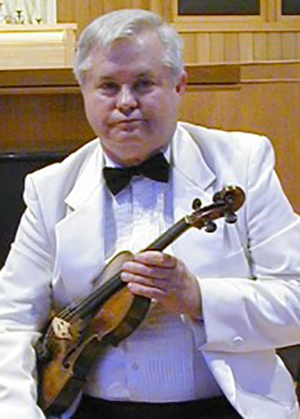In the fifth and final episode of Opus 3, we delve into the intersection of chamber music and orchestra playing. At first glance, these two vehicles of musical expression may seem miles apart; however, there are some fundamental similarities and a shared lineage that closely link these two together. In the history segment, Brandon investigates the connections between the early beginnings of the orchestra and chamber music genres. In the technique lesson, Sarah looks at how chamber music techniques can be applied and used in an orchestral setting. We are honored to have one of Willie’s earliest mentors, Mr. Dennis Bourret, as our honored guest in the interview portion. In the Skyros Chat, Sarah and Brandon sit down to talk about one of their favorite subjects, fantasy literature writer J.R.R. Tolkien.

In the history portion of Opus 3, Episode 5 of The Counterpoint Club, Brandon unpacks the complex relationship between orchestral and chamber music, going back to the roots of the modern orchestra in the court of King Louis XIV. Brandon then traces the development of chamber music as a distinct genre in the string quartet music of Franz Joseph Haydn, and discusses the role it has played throughout history both as a leisure activity for the amateur, as well as a professional career path. Finally, he sheds some light on the more recent rise of small, conductorless chamber orchestras – evidence of chamber music’s continued influence on the orchestral world.
 In the technique lesson, Sarah outlines some tips for bringing chamber music skills into an orchestral setting. Download the worksheet for a more detailed written list!
In the technique lesson, Sarah outlines some tips for bringing chamber music skills into an orchestral setting. Download the worksheet for a more detailed written list!
The techniques discussed are:
- Leadership from every seat
- Body movement for communication
- Swapping ego and competition for being a supportive colleague
- The orchestral layer cake of sound

 The final interview of Opus 3 is a conversation with Dennis Bourret. Mr. Bourret is a violinist and violist, and has been director of Tucson Junior Strings for 51 years. TJS is a multi-level youth orchestra program that trains each of its six ensembles to perform without a conductor. As a young musician, Willie grew up playing in TJS for eight years. He was thrilled to share this conversation with Justin and Mr. Bourret, who was and continues to be an inspiration and mentor. In this interview, Mr. Bourret discusses the combination of chamber music and orchestral playing in his pedagogy and how he trains students at all levels to perform without a conductor.
The final interview of Opus 3 is a conversation with Dennis Bourret. Mr. Bourret is a violinist and violist, and has been director of Tucson Junior Strings for 51 years. TJS is a multi-level youth orchestra program that trains each of its six ensembles to perform without a conductor. As a young musician, Willie grew up playing in TJS for eight years. He was thrilled to share this conversation with Justin and Mr. Bourret, who was and continues to be an inspiration and mentor. In this interview, Mr. Bourret discusses the combination of chamber music and orchestral playing in his pedagogy and how he trains students at all levels to perform without a conductor.
Dennis R. Bourret has directed Tucson Junior Strings since 1970. He received his Bachelor of Music and Master of Music degree in performance from Colorado University, and a BME from Denver University. He has conducted All-State, Regional Orchestras and All-City and Festival Orchestras in Nevada, Idaho, Kansas and Arizona. He has been principal violinist and violist of the Tucson Symphony, Arizona Opera, and Tucson Pops Orchestra. He has been guest conductor for the Southern Arizona Symphony and was a founding member of the piano quartet, Cremona Collage which traveled to Sao Paulo, Brazil for a performance tour in June 1995. Currently he is affiliated with Ensemble Gaudeamus which initiated the Big Horns Chamber Music Festival in Sheridan, Wyoming in 2000.
Sarah and Brandon discuss the works of J.R.R. Tolkien and how his literature has influenced their creative endeavors.
They both recently enjoyed a sweet little book by Pacific Northwest author Noble Smith called The Wisdom of the Shire: A Short Guide to a Long and Happy Life so we are sharing it here!
The Wisdom of the Shire: A Short Guide to a Long and Happy Life

How has playing in a chamber ensemble affected your orchestral playing? Leave us a message in the comments!
